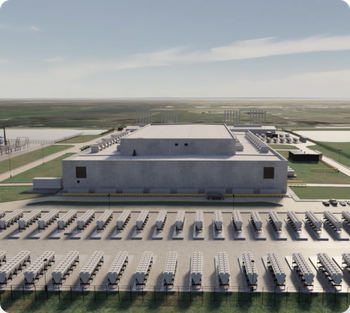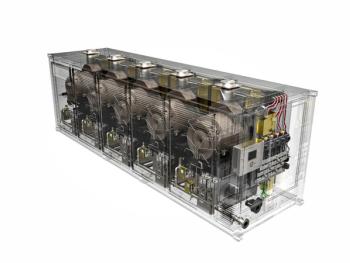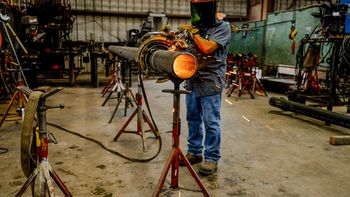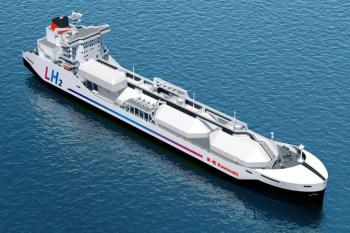
- September/October 2025
- Volume 66
- Issue 5
Hydraulic Institute Talks Pump Technology, AI Analysis, and Certification
Key Takeaways
- The Hydraulic Institute develops standards and provides education for pump systems, with over 120 corporate members and various partners.
- Technological advancements in pump systems enhance performance, predictive maintenance, and energy efficiency require new standards and training.
Michael Michaud of the Hydraulic Institute says design improvements, more efficient motors, and AI-enabled analysis technologies will improve pump reliability and maintenance.
With new technology continuously integrated in the turbomachinery industry, market dynamics, regulations, and standards must evolve alongside this innovation.
Michael Michaud, Executive Director of the Hydraulic Institute, spoke with Turbomachinery International about the group’s history, the advantages/disadvantages of rapid technology integration, education and certification, and much more. Per Michaud, AI-enabled performance data analysis and efficiency improvements will require the establishment of new standards and training methodologies.
Tell us about the Hydraulic Institute.
Michaud: Hydraulic Institute (HI) was founded in 1917, when several leading pump manufacturers decided to develop a common methodology to test pumps and streamline procurement. The pump test standard was the first, and HI now has 36 ANSI/ HI Standards. Membership has grown as well, from the dozen or so manufacturers in 1917 to over 120 corporate members that manufacture pumps and pumping systems and associate members who supply components like motors, drives, seals, bearings, etc.
In addition, HI has a growing group of partners who are not manufacturers but align with our core interests. Standards partners include engineering firms that design and specify pumping systems and end-users like municipal water/wastewater or chemical processing facilities. Training partners include end-users and other organizations, which both contribute to and consume training through Pump Systems Matter, HI’s training organization. Today, HI is where pump manufacturers, designers, end-users, and more come together to advance the mission to drive all pump system stakeholders toward a sustainable future.
What are the biggest challenges for the pump industry?
Michaud: Helping customers solve their fluid-handling needs will still be front and center, but keeping pace with technological changes brings some exciting new challenges. Some of these challenges will stem from new customer needs as they push pump manufacturers to advance designs and achieve new performance levels for brand new requirements/materials. Other challenges include embedding new technologies in our products to make them smarter, more adaptive, and more communicative.
How is the Hydraulic Institute seeing advanced pump technology being integrated to enhance the performance, predictive maintenance, and energy efficiency of modern pumping systems?
Michaud: From hydraulic design improvements to more efficient motors to better connectivity or integrated drives that can adjust automatically to different flow requirements—pumps and pump systems keep getting better. These changes improve the operational reliability, as uninterrupted service, fewer incidents, and fewer maintenance calls are what most want in a pumping system. As a byproduct, however, a well-designed, efficient pumping system can also give back in terms of savings: saving dollars, downtime, and lowering electric bills.
How does the Hydraulic Institute support decarbonization in the pump sector?
Michaud: When pump systems are operated at (or close to) their best efficiency point (BEP), they are the most efficient, and while a carefully selected pump can be very efficient, most pumping systems are oversized and do not run close to their BEP. Putting in place a system to conduct regular pump system assessments is a good place to start, so HI develops tools that can be used across virtually any application or pumping system.
Our Pump System Optimization (PSO) guidebook takes readers through the principles. Our PSO course guides students through the complete process of conducting an assessment and understanding how to optimize the system for both energy and performance. Remember, beyond the energy savings, a system that is operating at BEP has less wear, is more reliable, and requires less maintenance.
The Pump System Assessment Professional (PSAP) Certification is a stamp of approval for an individual who can identify savings and recommend adjustments to ensure long-term reliability and the most energy-efficient and reliable system. Facilities with many pumping systems or with complex fluid-handling requirements should consider having one PSAP-certified expert on staff to conduct regular audits.
How do pumps support the turbomachinery industry’s goals in terms of energy efficiency and reliability?
Michaud: When you consider the energy consumed by rotating equipment in a facility, pumps are generally the most energy intensive, especially when compared to fans and compressors. This is why the Department of Energy (DOE) started to regulate pumps for energy efficiency in 2020. While the DOE regulations (and the HI Energy Rating) focus on clean-water commercial and industrial pumps up to 200 hp, other pumps still benefit from the industry-made design improvements to comply with the new requirements. Along with the advances in motor and drive technologies, more fully integrated pumps (often referred to as smart pumps) can adjust automatically to different flow requirements as the system needs change.
What trends and/or advancements are you anticipating over the next several years?
Michaud: Look for more connectivity, which means more data and more opportunities to optimize. AI will play a role and is already making an impact in analyzing performance data, preventing failures, and optimizing maintenance opportunities. Sharing this data with OEMs will allow them to aggregate this data with data from other end-users to provide even better predictability.
What’s next for the Hydraulic Institute?
Michaud: HI is on the same trend line as the overall industry, so as technology continues to evolve, new standards and guidelines will be needed, and HI will be there. As the workforce continues to change, more training, at different levels and for different audiences, will be needed. The recent Pump System Certified program was developed specifically for this purpose. It is one part training so that individuals have a clear learning path to prepare them for a career, and another part exam so that they (and their employers) have the confidence and skills needed for the job.
Of course, HI will continue to leverage technology to make its trusted resources more accessible. In addition to growing the online library of industry standards, training, and other resources, the
Articles in this issue
3 months ago
Myth: High-Speed vs. Low-Speed BalancingNewsletter
Power your knowledge with the latest in turbine technology, engineering advances, and energy solutions—subscribe to Turbomachinery International today.




